Catholic Social Teaching is the great wealth of Church teaching on how to live out our faith in the world.
Formed by the wisdom of Church leaders and shaped by the daily experience of Catholics everywhere, it gives us a moral compass to find our way. At Caritas our mission is based on core principles of Catholic Social Teaching. Here are nine principles, illustrated by some of the Church’s most resonant texts and stories from our work.
Integral human promotion
INTEGRAL HUMAN PROMOTION
“The truth of development consists in its completeness: if it does not involve the whole person and every person, it is not true development.”
Pope Benedict XVII, Caritas in Veritate (Charity in Truth), 2009, #18
The Church teaches us that human development must be holistic and cannot be restricted to economic growth alone.
To be authentic, it must cover all aspects of life: spiritual, cultural, moral, physical and mental. It cannot take place at the cost of the earth, but must allow the human person to flourish in harmony with creation.
Martin Waru is a refugee from South Sudan living in a huge camp in Uganda. Far from existing on aid, however, he is working to create a new life for his family and his fellow refugees.
“I went to a Caritas-supported Farmers’ Field School, where I learned agricultural technology,” says Martin. “I learned about the different crops, about irrigation and about raising livestock.”
Martin has also set up a savings group and now he and his friends have invested in goats and chickens and set up a carpentry workshop. Within the confines of a refugee camp, Martin has found safety, community, dignity in work and care for the earth.
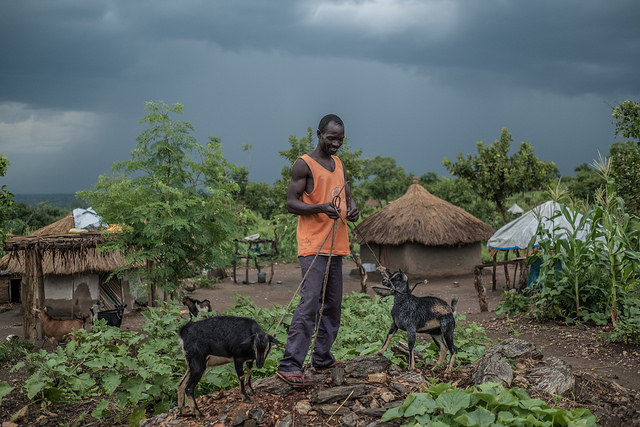
Martin Waru, 42, from South Sudan went to a Caritas-supported Farmer’s Field School, where he learned new agricultural technical skills. Photo by Tommy Trenchard/Caritas
Dignity
DIGNITY
“The dignity of the human person is rooted in their creation in the image and likeness of God.”
Catechism of the Catholic Church, #1700
Since every person is created in the likeness of God, they have an inalienable dignity that should always be safeguarded. Human life is sacred. We are called to treat every person and every creature with loving respect, seeing them as both a reflection of God and a mirror of ourselves.
Having access to basic human rights such as the right to food, shelter and education is a fundamental requirement for living with dignity.
When Stefan, a writer from Caritas Germany visited a Rohingya refugee family in a Bangladesh camp, they told him they wished to return to Myanmar, adding “but only if we are treated as human beings”.
Stefan asked: “What is your understanding of being treated as a human being?”
“To be treated like I am treated today,” replied the father, Omar, after some thought. “You came into my poor hut and I offered you something to sit on. But you sat on the floor with me and my family. You listened and you took us seriously. You showed us respect.”
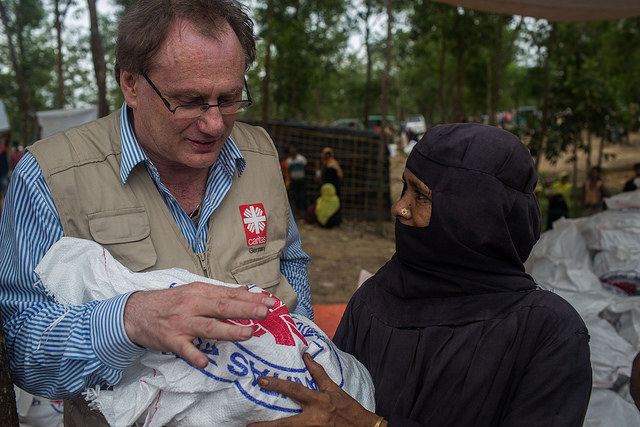
A Rohingya refugee and Stefan Teplan, writer from Caritas Germany, at the TV Tower refugee camp distribution point near Cox’s Bazar, Bangladesh. Photo by Lauren DeCicca/Caritas
Solidarity
SOLIDARITY
“…a firm and persevering determination to commit oneself to the common good; that is to say, to the good of all and of each individual, because we are all really responsible for all.”
St John Paul II, Sollicitudo Rei Socialis (The Social Concern of the Church), 1987, #38
We are all responsible for each other. It is a simple calculation: the world becomes a better place to live if we build a community where everyone can reach their full potential, through respect for each other’s dignity, rights and responsibilities. As St John Paul II wrote, “We are all one family in the world.”
Caritas is committed to solidarity among all peoples, but particularly with poor people, seeing the world through their eyes, and recognising the interdependence of the human family. Solidarity includes the persevering determination to work for the common good.
Noor Tarazi works for Caritas in Gaza coordinating mobile medical teams. They offer free health care to some of the poorest people in the Gaza Strip. A mother of four, Noor empathises with the women who come to the Caritas clinics. Knowing how it feels when her own children need medical care inspires her to help vulnerable children in these remote communities.
“We do everything that we can to see them smile again,” Noor says. She refuses to leave Gaza, despite hardship and poor security. “If people like me left Gaza, who would stay to help these people and rebuild this place again?”
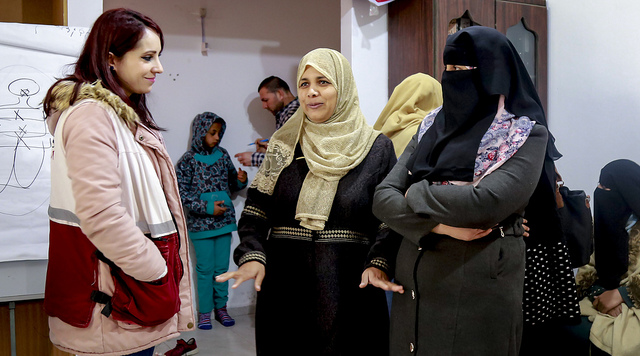
Noor Tarazi at the Caritas medical clinic in Gaza. Photo by Asmaa El Khaldi/Caritas
The common good
THE COMMON GOOD
“Everyone must consider their every neighbour without exception as another self.”
Second Vatican Council, Gaudium et Spes (The Joys and Hopes), 1965, #27
The good of each human person is intimately related to the good of the whole community. When one is hurt, all are in pain.
Our communities must allow everyone to participate in society and share in the goods of creation. This means all of society working together and leaving no-one behind, especially the poorest and most vulnerable.
In Venezuela, skyrocketing inflation has pushed 92 per cent of people into poverty. Families cannot buy food or medicine.
In answer, 20,000 Caritas volunteers have come forward to serve their neighbours. At Caritas Los Teques (pictured), volunteers show off the huge pot they use for soup at a parish centre. People come to eat, share stories and support one another. Community kitchens like this have served up over 1.25 million meals.
Many of the volunteers are medical personnel, who offer health care, nutrition monitoring and supplements. Their reward is in the faces of the children they reach. “We’re seeing children recover the joy of childhood,” says Caritas volunteer Dr Albina Rosas.

Volunteers from Caritas Venezuela. Photo by Caritas Venezuela
The option for the poor
THE OPTION FOR THE POOR
“In teaching us charity, the Gospel instructs us in the preferential respect due to the poor and the special situation they have in society.”
St Paul VI, Octogesima Adveniens (A Call to Action), 1971, #23
A basic moral principle for judging a fair society is the way in which it treats its most vulnerable members, whose needs should come first. At Caritas, our central mission is to combat poverty and promote the rights and dignity of poor and vulnerable people.
The Church teaches that people are more important than assets, and employment is more important than capital. The economy, including the market, should serve the people and not the contrary. It should be oriented towards a fair distribution of resources, and not exploit the poorest.
Human trafficking is a crime that turns people into objects to be traded, bringing suffering that can last a lifetime.
Meena (right) volunteered to be trained by Caritas Nepal to identify when people might be bought and sold by human traffickers. In this area, impoverished people are very vulnerable to employment scams and trafficking. It is common for Nepali girls to be tricked into leaving home and end up in brothels in India.
Meena’s 14-year-old neighbour, Nagchung Sherpa, was approached by a female trafficker who was trying to trick her into leaving her home and country with the lure of a good job. Meena helped Nagchung reject the woman and stay safely with her family.

Nagchung Sherpa and Meena. Photo by Laura Sheahen/Caritas
Care for creation and nature
CARE FOR CREATION AND NATURE
“Human life is grounded in three fundamental relationships, with God, with our neighbour, and with the earth itself.”Pope Francis, Laudato Si’ (On care for our common home), 2015, #66
We believe that the earth and all its resources have been entrusted to us by God, who made us guardians of creation. Ensuring that nature is respected and managed sustainably for future generations is part of our Christian vocation.
Since everything is interconnected, we cannot ensure the true development of the human person without caring for our common home. In 2015, Pope Francis crystallised Church teaching on creation in his letter, Laudato Si’. He challenges all of us to consider how our actions are affecting the earth and the poor.
Fisherman Tony Raymond on Vanuatu in the Pacific sees the fish he catches getting smaller and the reef dying. Every year, Caritas in Oceania compiles a report from all around the Pacific, on the impact of climate change as experienced by people like Tony on the front line.
The reports tell of rising water tables, salt seeping into groundwater, poisoned fish and dying mangroves. Caritas documents people who are being forced by rising sea levels to abandon their houses.
“It is about our homes,” says Archbishop Peter Loy Chong from Fiji. “My people are weeping; who will dry their tears?”
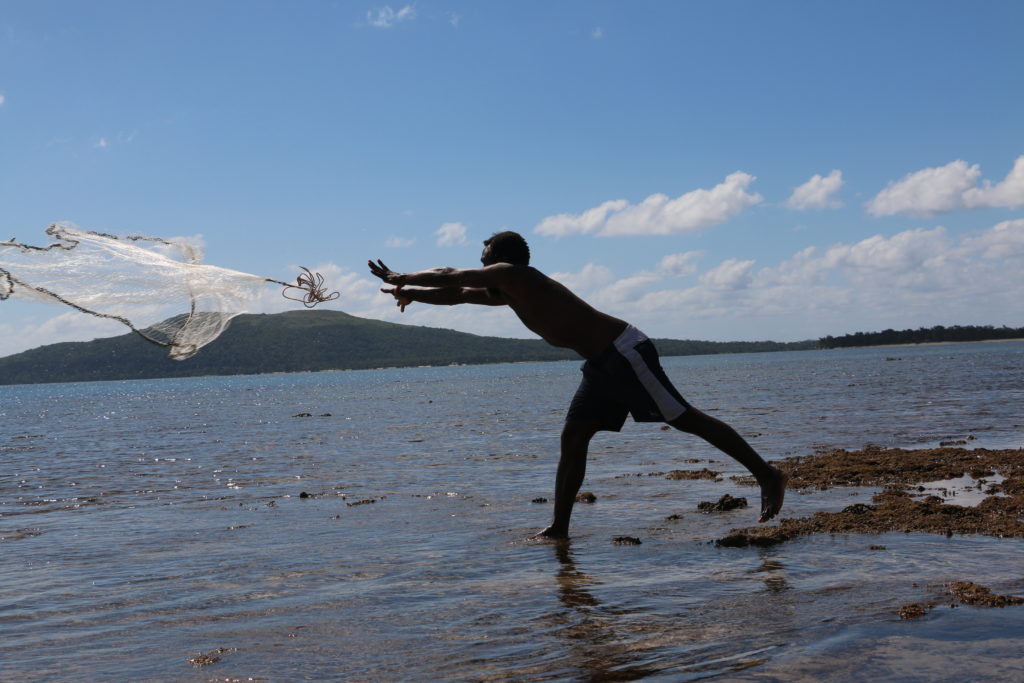
A fisherman casts his net in Vanuatu in the South Pacific, where locals are pressing for a ban on seabed mining. Photo: Caritas
Peace
PEACE
“Our common bonds of humanity demand that we live in harmony and that we promote what is good for one another. These ethical implications are the reason why solidarity is a basic key to peace.”
St John Paul II, Development and solidarity: two keys to peace, 1987, #7
The Church teaches that peace is about positive action, not just the absence of war. It implies fair relations among people and between people and the environment. It can only come about in conditions of justice and solidarity. The human person cannot flourish without peace.
As Caritas we promote a culture of non-violence and support programmes that encourage reconciliation and peaceful co-existence.
No family has escaped the pain of the war that has been raging in Syria for eight years. “Everyone is aching, and people’s hearts are filled with hatred and pain,” says Sandra of Caritas Syria.
That is why, as part of a Global Week of Action in solidarity with refugees and migrants, our team in Syria hosted a unique event. They invited people from different sides of the conflict to sit at the same table and share a meal: Christians and Muslims, Alawites and Druze.
Despite initial misgivings, people ended by sharing experiences and praying together for their common desire – peace in Syria. As Sandra says: “They told us we had not only fed hungry people with a rich meal, but we had also touched their hearts deeply, and helped them start forgiving and connecting with others.”
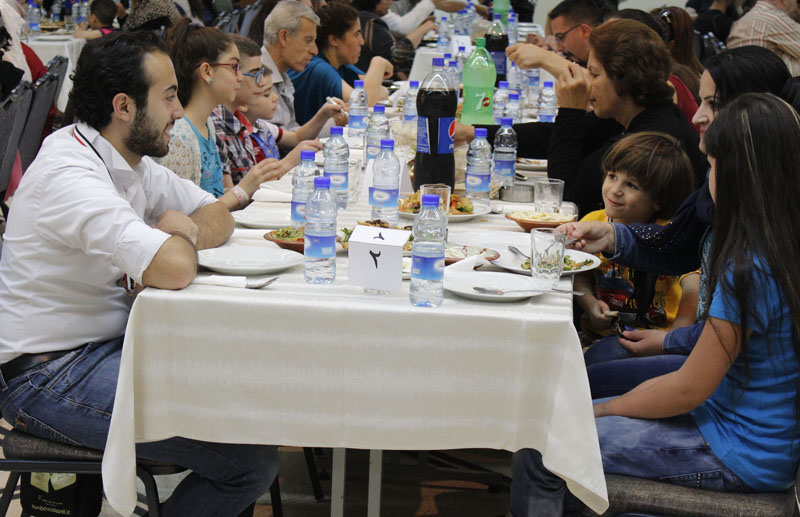
Families meet at the Caritas Syria Share the Journey meal
Participation
PARTICIPATION
“Participation is the voluntary and generous engagement of a person in social interchange. It is necessary that all participate, each according to their position and role, in promoting the common good.”
Catechism of the Catholic Church, #1913
The Church teaches that individuals and communities must be allowed to participate in the decisions that affect their lives. For Caritas this means making sure the voice of the poorest is heard on the world stage. It also means putting the people we serve at the centre of how we structure our programmes.
Since we all have a duty to take part in society to promote a better world, Caritas also provides many opportunities for supporters to campaign and lobby in solidarity with their sisters and brothers in need.
“These inspiring projects show how things can change when you believe in something big,” says youth leader Sarah Burrows from the UK. Caritas has pledged to give young people ways to put their beliefs into action by working for social justice.
The Caritas Youth Forum was set up in 2017 by young people from each of our seven regions worldwide. Young leaders met in Rome in 2018 to set their own three-year plan of work. This has gone forward with the first YoungCaritas conference in Vienna attended by people from 32 countries.
Caritas youth in Latin America are getting together to find answers to the problems faced by young people in their countries. Dozens of young Caritas leaders attended World Youth Day in Panama in January 2019. They are active in volunteer coordination, peacebuilding, campaigning and emergency response. All of these youth initiatives seek to give power to young people to influence the world around them.
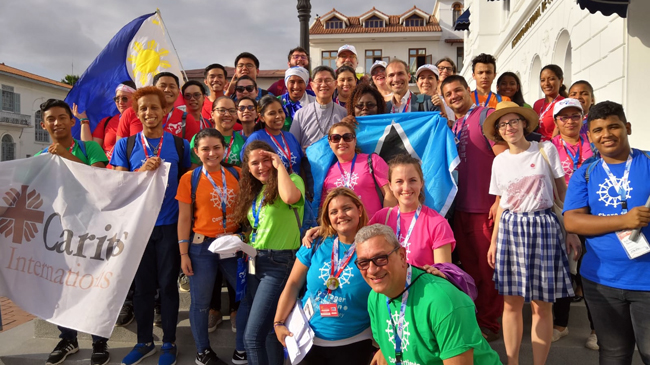
Caritas Youth Forum during World Youth Day 2019 in Panama. Photo by Caritas
Role of government and subsidiarity
ROLE OF GOVERNMENT AND SUBSIDIARITY
“Subsidiarity respects personal dignity by recognising in the person a subject who is always capable of giving something to others.”
Pope Benedict XVI, Caritas in Veritate (In Charity and Truth), #57, 2009
The Church believes strongly that governments and civil society must respect the principle of subsidiarity. This means a central authority should perform only tasks that cannot be carried out at a more local level.
In other words, local groups should be given the power to carry out their own duties to work towards the common good. As Pope Benedict wrote, giving people responsibility “fosters freedom and participation”.
At a major Vatican conference on protecting the environment, Delio Siticonatzi, a young Amerindian of the Asháninka people in Peru, spoke out to describe what climate change and environmental destruction are doing to his people’s homelands.
Pope Francis puts a high value on the ecological wisdom of indigenous people, and is asking them to lead the way. In his words, “We need the native peoples to shape the culture of the local Churches in the Amazon.”
So Caritas partner REPAM has field teams in nine countries across the Amazon consulting indigenous peoples, rural communities, social movements and pastoral workers who are taking matters into their own hands. It is time to strengthen the voices of these guardians of creation.
As one Peruvian elder said: “We, the indigenous peoples, are tired of every government in history taking all the riches that we have in the Amazon.”
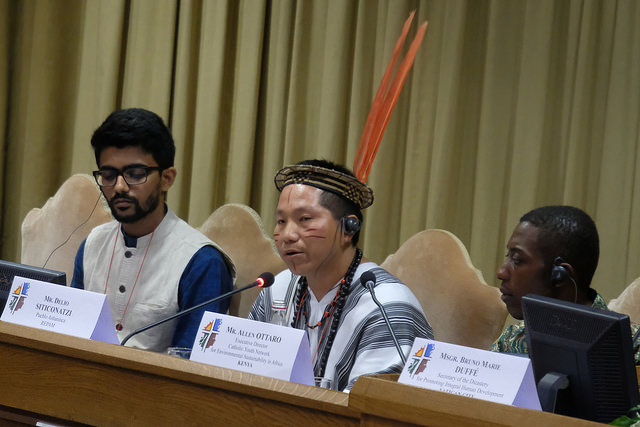
Delio Siticonatzi, centre, at the 3rd anniversary Laudato Si’ conference. Photo by Patrick Nicholson/Caritas
